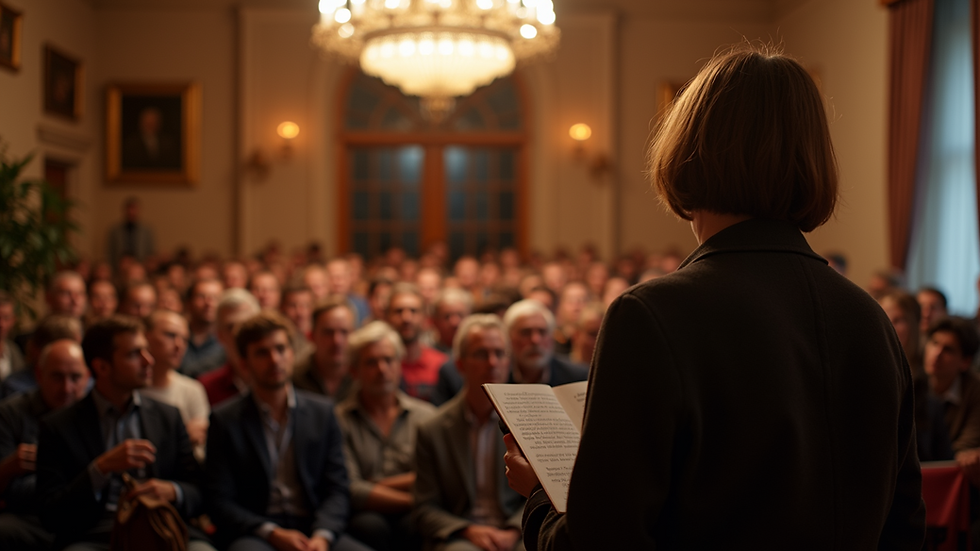Salvation and Freedom in Poetry: A Journey of Personal Liberation
- Joel Youngquist

- Aug 9, 2025
- 4 min read
Updated: Aug 11, 2025
Poetry has always been a sanctuary for the soul, a sacred space where thoughts, emotions, and experiences converge to create a tapestry of meaning. It serves as a mirror reflecting our innermost struggles and triumphs, offering a pathway to salvation and freedom. In this reflective exploration, I will delve into how poetry acts as a medium for personal liberation and spiritual salvation, drawing from my own encounters and experiences.
The Healing Power of Words
Every time I open a book of poetry or sit down to write my own verses, I feel a wave of solace wash over me. Words have a unique ability to heal; they contain the power to articulate the unspeakable. I remember a time when I was overwhelmed by the weight of anxiety and uncertainty. Through writing poetry, I translated my turmoil into words, transforming my pain into verses of empowerment.
Poems like Rainer Maria Rilke's "The Panther" and Maya Angelou's "Still I Rise" offer a lens through which I can view my own struggles. These texts resonate with the notion that freedom is not granted, but rather earned through courage, vulnerability, and resilience.

Reflection and Self-Discovery
Writing poetry has often led me on a journey of self-discovery. Each poem becomes a stepping stone, guiding me towards deeper truths about myself. When I write, I not only explore my external world but also delve into the complexities of my inner landscape.
I recall a particular evening when I decided to pour my heart into a poem about lost love. The act of writing allowed me to reflect on my emotions, compartmentalizing the chaos and confusion. In those moments, poetry became a bridge to freedom from the past. I could finally acknowledge my pain and release it into the verses.
Through this reflective process, I embrace the concept of “letting go.” Poetry encourages us to confront our lingering hurts, transforming them into something beautiful—a farewell letter to our past selves.

The Collective Voice of Poetry
Poetry does not exist in a vacuum; it thrives in community and connection. Throughout history, poets have given voice to the marginalized, the unheard, and the oppressed. In this way, poetry serves as a tool for social liberation, transcending individual experiences to touch the collective consciousness.
Consider the works of poets like Audre Lorde or Langston Hughes. Their verses speak volumes about the struggles of identity, race, and freedom. As readers, we enter a dialogue with their words, feeling a sense of empowerment as we connect with their truths.
Moreover, when we share our poetry within a community, we create a shared space for healing and understanding. I often participate in local poetry readings, where each voice, regardless of experience, contributes to a tapestry rich with diversity and authenticity. These evenings are a reminder that we are never alone; our voices come together to echo the stories of our shared humanity.

Creating Freedom Through Expression
Poetry is not just about writing; it is an act of rebellion against silence. For many of us, expressing our emotions and thoughts can be stifled by societal expectations or personal fears. However, engaging in poetry allows us to break free from these constraints.
Through each stanza, I invite freedom into my life. It is an invitation to explore themes of love, loss, joy, and despair without fear of judgment. The act of penning down my fears into verses metamorphoses that fear into freedom.
Writing poetry has taught me to value my voice. I learned that my experiences, no matter how trivial they may seem, deserve to be shared. In doing so, I not only liberate myself but also inspire others to do the same. Encouraging others to express themselves can create a ripple effect, fostering a culture of openness and healing.
Embracing Spiritual Salvation
For many, poetry is not just a reflection of personal struggles but also a pathway to spiritual salvation. It serves as a medium through which we can connect to something larger than ourselves—be it the universe, nature, or divine energy.
In my experience, reading or writing poetry during moments of solitude often brings a profound sense of peace. Whether I am exploring themes of nature or delving into existential questions, poetry opens the door to contemplation and connection. It invites me to consider my place in the world, allowing me to recognize the beauty in both suffering and joy.
The act of sharing these spiritual explorations through poetry becomes an act of love, allowing others to join in this healing journey. It encourages a community filled with empathy and understanding, uniting us in our shared quest for meaning.
Poetry as a Lifeline
In conclusion, poetry serves as a vital tool for personal liberation and spiritual salvation. As I have shared through my own experiences, it offers a space for healing, reflection, and expression. The themes of salvation and freedom intricately weave through the fabric of poetry, allowing us to navigate our emotions and connect with others.
Each time I write, I reclaim my voice and reshape my narrative. This journey through the written word becomes a celebration of resilience and an affirmation of the power of expression. So, let us continue to write, read, and engage with poetry as it transports us toward liberation and spiritual enlightenment. For in poetry, we find salvation.
The journey is ongoing and fraught with challenges, but every line we write and every poem we share contributes to a greater sense of freedom—not just for ourselves, but for everyone who seeks solace in the might of words.



Comments